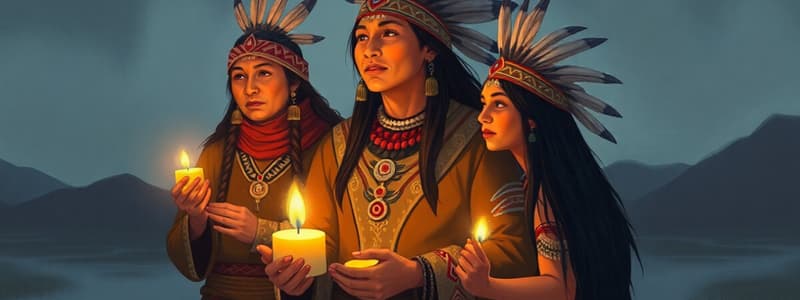Podcast
Questions and Answers
What is the FNMI population of Canada generally referred to as?
What is the FNMI population of Canada generally referred to as?
- Native North Americans
- Indigenous Peoples (correct)
- First Nations Communities
- Cultural Minorities
Which of the following best describes the Honourable Harvest?
Which of the following best describes the Honourable Harvest?
- A ceremony to give thanks for the earth’s resources
- A type of agricultural method used by FNMI peoples
- Guidelines for sustainable gathering practices (correct)
- A festival celebrating the autumn season
What is meant by a land acknowledgement?
What is meant by a land acknowledgement?
- Recognizing the traditional territory of Indigenous Peoples (correct)
- A demographic summary of Indigenous populations
- A government document stating land ownership
- A formal agreement on land usage
Which of the following is NOT one of the four sacred medicines?
Which of the following is NOT one of the four sacred medicines?
What role does an elder play within FNMI communities?
What role does an elder play within FNMI communities?
Nature Deficit Disorder primarily refers to which issue?
Nature Deficit Disorder primarily refers to which issue?
Which of the following characters is featured in the Haudenosaunee Founding Story?
Which of the following characters is featured in the Haudenosaunee Founding Story?
Which of the following is a characteristic of oral tradition?
Which of the following is a characteristic of oral tradition?
Flashcards are hidden until you start studying
Study Notes
FNMI Population of Canada
- The Indigenous population of Canada is significant and diverse.
- FNMI refers to First Nations, Inuit, and Métis peoples.
Indigenous Peoples
- "Indigenous" refers to peoples who were living in a specific territory before contact with Europeans.
Geographic Regions
- Historically, FNMI peoples have been categorized by geographic regions.
- These regions are based on shared cultural practices, languages, and traditions.
Honourable Harvest
- The Honourable Harvest is a traditional set of practices for sustainably harvesting resources.
- It emphasizes respect for the environment and a balance between taking and giving.
Land Acknowledgement
- A land acknowledgement recognizes the historical and ongoing presence of FNMI peoples on a specific territory.
- It acknowledges the original stewards of the land.
Nature Deficit Disorder
- Nature Deficit Disorder describes the negative consequences of human disconnection from nature.
- It highlights the importance of experiencing the natural world for well-being.
Elders and Their Roles
- Elders are highly respected members of FNMI communities.
- They are considered repositories of traditional knowledge, culture, and wisdom.
- Elders play crucial roles in guidance, storytelling, and spiritual teachings.
Onondaga Creation Story
- The Onondaga creation story is a central myth in Haudenosaunee culture.
- It describes the origins of the world and the relationship between humans and nature.
Haudenosaunee Founding Story Characters
- Hiawatha is a legendary figure associated with the establishment of the Haudenosaunee Confederacy.
- The Peacemaker is a spiritual leader who brought peace and unity among the Haudenosaunee nations.
- Jiginsaseh is the name of the "Great Law" or constitution of the Haudenosaunee Confederacy.
- Tadadaho is a powerful and important figure who represents the spiritual connection to the natural world.
Oral Tradition and Characteristics
- Oral tradition is a vital way of transmitting knowledge and history within many FNMI communities.
- It often incorporates social commentary, intergenerational learning, warnings, lessons, humor, and other forms of expression.
Seven Grandfather Teachings
- The Seven Grandfather Teachings are a central set of principles guiding Haudenosaunee culture and ethics.
- They encompass concepts such as wisdom, love, respect, courage, honesty, humility, and truth.
The Four Sacred Medicines
- The four sacred medicines are tobacco, cedar, sage, and sweetgrass.
- They are used in traditional ceremonies for purification, healing, and spiritual connection.
Smudging Ceremony
- The smudging ceremony is a practice using the four sacred medicines to cleanse spaces and individuals.
- It is often performed to promote healing, peace, and spiritual harmony.
Thanksgiving Address
- The Thanksgiving Address is a traditional ceremony of expressing gratitude to the natural world and all beings.
- It acknowledges the interconnectedness of life and the importance of respect for the Earth and all its inhabitants.
Studying That Suits You
Use AI to generate personalized quizzes and flashcards to suit your learning preferences.




